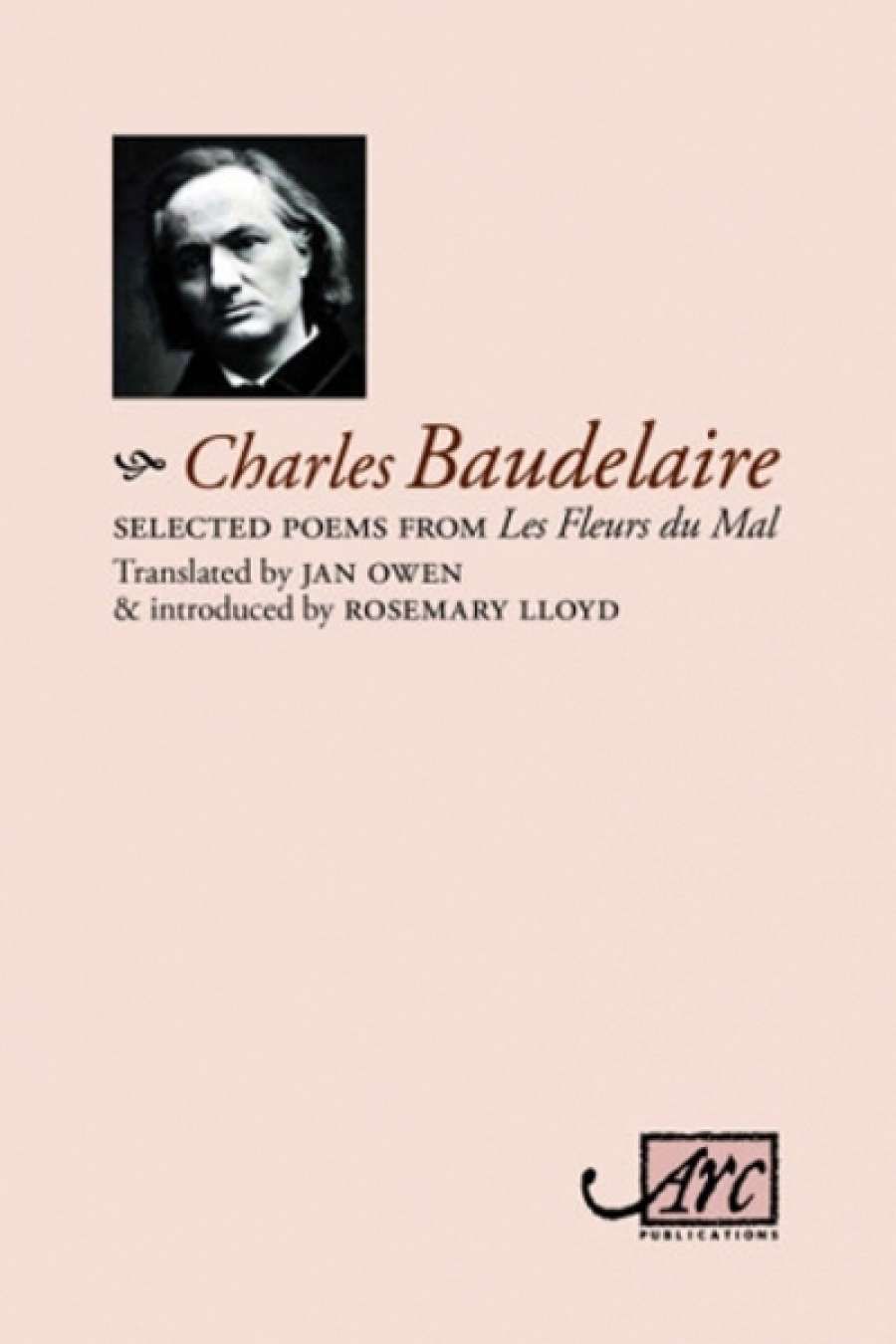
- Free Article: No
- Contents Category: Poetry
- Custom Article Title: Brian Nelson reviews 'Selected Poems from Les Fleurs du mal' by Charles Baudelaire, translated by Jan Owen
- Review Article: Yes
- Online Only: No
- Book 1 Title: Selected Poems from Les Fleurs du mal
- Book 1 Biblio: Arc Publications, £13.49 hb, 189 pp, 9781908376411
The poet is like the flâneur, the urban figure Baudelaire made famous. The flâneur is a stroller, a pedestrian who walks slowly and at random through the city, immersing himself in the impressions of the moment. He is a passionate observer who gazes with fascination as others are dragged along by the deadening routines of bourgeois existence. Baudelaire wrote about the experience of alienation and disconnection, but this was the condition of a new and vital kind of perception. Much of his work embodies, and reflects upon, the excitement of struggling to master a set of appearances that threatens to remain illegible. The pleasure he feels, linked with the satisfaction of decoding the signs of the city, lies in a vicarious sense of adventure.
Jan Owen's translations succeed, often brilliantly, in capturing Baudelaire's voice, his characteristic tone – or rather, his range of tones (tender, melancholic, sardonic, corrosive). Take her translation of the famous sonnet, 'À une passante' ('To a Woman Passing By'), the dramatic effect of which derives to a large extent from Baudelaire's ironic transformation of the romantic myth of 'love at first sight' into what Walter Benjamin memorably termed 'love at last sight'. The poem is admirable in its evocation of what Benjamin called the 'shock' experience characteristic of modern urban life: unforeseeable, momentary experience; a lightning flash followed by night.
À une passante
La rue assourdissante autour de moi hurlait.
Longue, mince, en grand deuil, douleur majestueuse,
Une femme passa, d'une main fastueuse
Soulevant, balançant le feston et l'ourlet;
Agile et noble, avec sa jambe de statue.
Moi, je buvais, crispé comme un extravagant,
Dans son œil, ciel livide où germe l'ouragan,
La douceur qui fascine et le plaisir qui tue.
Un éclair ... puis la nuit! – Fugitive beauté
Dont le regard m'a fait soudainement renaître,
Ne te verrai-je plus que dans l'éternité?
Ailleurs, bien loin d'ici! trop tard! jamais peut-être!
Car j'ignore où tu fuis, tu ne sais où je vais,
Ô toi que j'eusse aimée, ô toi qui le savais!
To a Woman Passing By
All around me howled the deafening street.
Tall and slim, with sorrowful majesty,
a woman in full mourning passed me by,
her sumptuous hand swinging her festooned skirt.
She was lovely as a statue, lithe and tall.
I tensed like a raving fool, drinking in
the heaven of those grey eyes where storms begin –
bewitching sweetness, pleasure that could kill.
One lightning flash ... then night! – Fleeting beauty,
whose glance lifted me back to life, will I ever
see you again this side of eternity?
Elsewhere, faraway, too late, maybe never!
Where was the other going? Neither of us could tell.
Yet I could have loved you. And you knew it well!'
'The hallmark of Owen's achievement ... is that she has produced English poems that ... are natural-sounding'
The hallmark of Owen's achievement, besides her sheer ingenuity and prosodic skill, is that she has produced English poems that, in contrast to the stilted versions of some previous translators of Baudelaire, are natural-sounding. This is facilitated by the choice of iambic pentameter rather than alexandrines (which can seem laboured in English), and the use of half rhymes rather than full rhymes. Owen stays as close as possible to the diction of Baudelaire's original poems while retaining their musicality and sense of rhythm, consistently achieving an easy, fluid, contemporary style that approximates to everyday speech. (At times this is reflected in a playful, colloquial catchiness: for example, a line of 'Le Crépuscule du matin' ['Dawn'], 'Les débauchés rentraient, brisés par leurs travaux', is rendered as: 'Worn-out womanizers hit the home path'.)
There have been many (fascinatingly different) translations of Baudelaire, especially since 1950. Those who have tried their hand include Seamus Heaney, Philip Larkin, and, notably, Robert Lowell. Jan Owen's translations may be ranked, I believe, with the best. She has done a great service not only for Baudelaire but also for the art of translation per se.


Comments powered by CComment